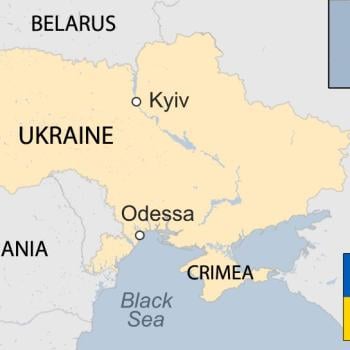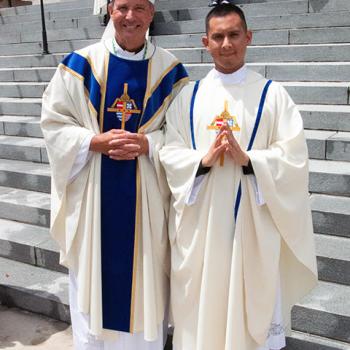My dad was an early adopter. He's told me stories of Ye Olden Dayes with his Commodore 64, when he and a friend would pick up issues of a computer magazine and man their stations around the machine—one at the keyboard, the other reading off code for a new program from the magazine's pages. (This, I must say, still seems insane to me.) When I was very young, we had a Mac Plus computer with a black and white monitor built directly into the case, prefiguring the look of the early iMacs by more than a decade. I learned how to use this computer, at least in a primitive fashion, when I was four or five years old. My dad created a few games for me, including the aptly titled "Eric's Game." My earliest memory of using a mouse comes from that game: click on a certain spot, and the Batmobile drove across the screen!
We upgraded to a color Mac—I think it was a Performa?—when I was eight. This opened up a swathe of new possibilities, since we now had access to the internet. The internet was still small enough then that bookstores sold Yellow Pages directories to the web that we took to be relatively comprehensive. But the internet was primitive at that point, and there wasn't a lot to do; the storehouses of time-sucking inquiry like Wikipedia and TVTropes did not exist. (And besides, we only had one phone line, so we couldn't spend much time on the internet anyway.)
The other thing our new Mac had that Mac Plus lacked was a CD-ROM drive, which often seemed more impressive than the internet at the time. I used it for games, occasionally—I remember playing the Star Wars clone of Doom, Dark Forces, with the cheat codes enabled—but the software that I spent the most time with was not a game at all.
It was a Microsoft Home disc, part of their education line, called Ancient Lands. Ancient Lands was essentially a hyperlinked picture-book encyclopedia of ancient Greece, Rome, and Egypt. It covered all kinds of topics—articles about architecture, famous people, and, of course, the mythology, which I spent many hours reading and re-reading. There was even the option to have a "guided tour" with one of several personages; the one I remember best was the Pharaoh Hatshepsut, whose tour of Egypt came with some commentary on gender roles in the ancient world and a slight feminist stance. (If you want to see what Ancient Lands looked like, as well as hear some extremely corny jokes told by a mummy, look at the introduction video on YouTube. Keep in mind, that animation probably took up a tenth of the disc.)
In retrospect, the CD's information was extremely cursory; most of the articles were only a paragraph or two long. It was a closer cousin to illustrated children's books than it was to Wikipedia. But then, as a child of eight or nine, that was more than adequate. I scavenged that CD for information every day for months, using it so often that the jewel case broke from wear. It opened my eyes to the ancient world before school had even mentioned it, and engendered a love for myth long before I had ever heard of Homer or Ovid.
I'm not sure what brought Ancient Lands to mind recently, but the more I think about it, the more I realize how formative it must have been in my development—not just as a person who likes Old Things, but as a Pagan. This was the place where I learned about the Olympians (and whether to include Hestia or Dionysus), about the Pharaohs, about the concordance between Greek and Roman religion—where I developed my first picture of the world that inspires my religion. And after I realized that, I thought, "How odd is that?"
Wicca, as envisioned by Gardner, was an initiatory religion—people were brought into covens only by other members of a coven. It was, essentially, a mystery religion, and as a result, its knowledge could only be transmitted orally. Things were written down, of course, but public dissemination of rituals and theology was verboten. As I understand it, the first widely published books on Wicca were scandalous to the initiated; that knowledge was meant to be passed down personally, from teacher to student. Reconstructionist religions, working off of extant mythology and academic works, may not always have that specific charge of personal transmission, but they attempt to recreate religions that were based in oral tradition; the personal transference of knowledge from the learned to the learning is fundamental to the history of Pagan religions. We are not People of the Book. Adapting to even that medium caused us no small amount of friction.
Yet now, so much of the business of the Pagan community is carried out online, and so many of the resources (like, well, this website) are on the web. This really is a drastic change from the way Paganism existed only a few decades ago. When Buffy the Vampire Slayer featured a character who referred to herself as a "technopagan" in 1998, that seemed like a subtle joke, in keeping with the show's tone; now I wonder to what degree "technopaganism" is not just the future of our religions, but the present-day reality. Certainly, much of my earlier knowledge of Wicca and mythology came from my parents, but more of it probably stems from a computer screen. I suspect that for those coming to Paganism for the first time, the internet is probably even more important in their development than it was in mine.
I can see a valid critique of internet-enabled Paganism, namely that the information passed along will, by necessity, end up being more generic and less personal than if that knowledge were passed along via the traditional methods. Is the greater availability of that knowledge—and, as importantly, the greater room for debate—worth that tradeoff? It's hard for me to say, having been privileged enough to experience both worlds. But I think this is a change we may not have fully grasped yet, and one that represents a more drastic shift in the fundamental assumptions of our religions than we might realize.
12/2/2022 9:01:58 PM





